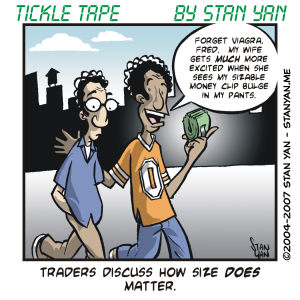It seems so easy: Find a good setup, place a bet, close out the trade and take home the profits. It may seem simple, but trading profitably and consistently eludes most traders. Trading experts note that even those traders who achieve early success don’t maintain it. It’s easy to make a series of profitable trades early in one’s career; the difficulty is trading profitably day after day, week after week, year after year.
When it comes to maintaining profitability over the long term, one must look deep into one’s psychological makeup and ask and answer tough questions: Why am I trading? What do I get out of it? Why should I continue to trade? Seasoned traders know the answer to these questions: Trading is intrinsically rewarding; it’s a fulfilling, enjoyable, and creative endeavour.
The experience of trading in and of itself provides its own reward. The most successful traders are so passionate about trading that they would trade regardless of how much money they made or how successful they were. For them, the intellectual and creative activities involved in the trading process constitute an optimal experience. They trade in a higher sphere, and maintaining this peak performance mindset ensures their lasting profitability.
Psychologists who study the motives behind people’s life pursuits have discovered that optimal experiences are intrinsically motivating. They are so engaging and interesting that just doing them is enjoyable. The extrinsic rewards, such as money or profits, are not nearly as motivating. When people engage in an intrinsically motivating task, they effortlessly focus all their attention on that task and achieve a level of experience that is optimal.
They don’t worry about success or a failure, and they don’t expect to receive any reward or gain from the endeavour other than the experience itself. They may desire a reward but they don’t need one. Emotions, such as fear, anxiety, and self-reproach, don’t even enter their consciousness. The experience is so intense that they tend to be concerned less with the final outcome, and more with the process as they experience it.
How does one trade in a higher psychological sphere? It’s vital that you satisfy lower-order needs, such as a need for self-esteem or recognition, so that you can focus on satisfying higher-order psychological needs, such as self-actualization and self-fulfilment. For example, when trying to satisfy a need for self-esteem or recognition, one may think becoming a success will help him or her feel safe, secure, and loved.
This belief can cause major problems when trading, for several reasons. First, placing too much emphasis on the outcome is bound to be distracting. Second, believing all your needs will be satisfied through trading will likely increase your fear, anxiety, and tension. Third, these unpleasant and distracting emotions will tend to interfere with your accurate assessment of market conditions and disrupt any clear-headed decision making, hurting your performance and creating a vicious circle of defeat.
What motivates your trading? Do you trade to satisfy social and emotional needs? Do you trade primarily to increase your feelings of safety and security? How do you remedy the situation if you are trying to satisfy these lower-order needs? To remedy this, consider satisfying your safety and security needs in other ways. For example, you could set lower standards for your lifestyle. Trying to maintain a rich, luxurious lifestyle will almost certainly interfere with your trading success. Most successful traders report they have settled into a lifestyle that does not depend very much, if at all, on their trading success.
Other social needs that may interfere with your trading performance, and should be addressed outside of trading, including the desire for friendship, affection, and love. Some individuals believe that trading is going to improve their ability to form satisfying relationships.
For example, many people believe that if they had enough money, their relationships would be far more satisfying. Although this seems reasonable, it is a fallacy. Wealthy people are no better at gaining love and affection than poor people. If you are hoping that your relationships will improve when you make more money through trading, you are mistaken. It’s a far better approach to limit your trading activity and take other steps to develop more satisfying relationships.
You may also trade because you desire recognition, appreciation, prestige, and status. It’s true that some individuals may give additional respect to those with a lot of money, but not everyone. In addition, needing others’ respect can be very difficult and disappointing. In the end, the road to happiness and success involves having respect for yourself. If you are hoping that you will somehow gain respect through making a bunch of winning trades, you will almost certainly be disappointed, and this drive for respect and continuing disappointment will interfere with cultivating a peak performance mindset.
Transforming the trading experience into an optimal experience may not be easy, but it’s something that the most profitable traders have achieved and sustain. Make sure that your social and emotional needs are satisfied outside of trading, and that you are able to focus intensely on the trading experience itself. If you can do so, you’ll find trading interesting, enjoyable and engaging, and be trading in a higher psychological sphere.


